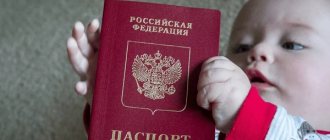Registration required
The question of why temporary registration or registration is needed is answered by the legislation of the Russian Federation. Government Decree No. 713 obliges the population to register at their place of residence. Only in this case, from the point of view of the state, is it possible to fully realize the rights and responsibilities of a citizen. At the same time, according to the Constitution of the Russian Federation, he has the right to choose a place to live at his own discretion.
Why does a citizen need registration?
Without registration, a citizen of the Russian Federation cannot officially find employment, and will also not be able to send their children to kindergarten or school.
Registration is a requirement for a number of legal procedures.
Accounting authorities
The registration of citizens of the Russian Federation and foreigners is carried out by the Federal Migration Service. It is to its department that documents must be submitted, after review of which the applicant is given a permanent registration stamp in his passport, or is issued a document confirming temporary registration at a specific address.
Registration procedure and deadlines
After being discharged from the previous month, within 7 days, citizens of the Russian Federation are required to register at their new place of stay. Otherwise they will be punished with a fine.
If you do not have a permanent place of registration, you can apply for temporary registration for 90 days.
The legislative framework
All issues of registration of citizens are regulated by the following legislative acts.
- Federal Law No. 5242-1 - establishes the constitutional right to freely choose a place of residence and the basic concepts used in legal acts. The law specifies the need for registration and provides the functionality and powers of supervisory authorities. All information about the registration or deregistration procedure is also given - deadlines, a list of necessary documents, and the responsibility of citizens for failure to comply with regulations.
- Civil Code of the Russian Federation - registration, in addition to registration, is a formalization of civil law relations. The main provision is the owner’s right to dispose and use residential premises (Clause 1, Article 209); in shared ownership, the implementation of this right requires the consent of the remaining owners (clause 1 of Article 247).
- Housing Code of the Russian Federation, regulating issues of staying in residential buildings and premises. According to Art. 30, the owner can transfer the right of ownership of housing on a contractual basis (rent, free use).
This means that the owner - alone or in a group - is allowed to resolve all issues related to the registration of a person at the place of stay. The footage of the property does not matter. Despite the fact that, on an intuitive level, logic suggests the opposite, the concept of a minimum share required for registration does not exist within the framework of current legislation.
Is it possible and how can I register for a share in an apartment or house if no one objects?
The division of an entire object into shares occurs as a result of privatization, transfer of property by inheritance, during the division of jointly acquired property by spouses, as a result of donation, sale. According to Art. 244 of the Civil Code of the Russian Federation, an apartment in shared ownership has several owners. Their shares in the object can be real (allocated in kind), for example, rooms in a communal apartment, or ideal. The latter are expressed as a fraction. Regardless of whether the share is large or small, the owner has the right to rent it out, sell it, or give it away.
If one of the co-owners decides to dispose of their property, it is necessary to ask the consent of the co-owner neighbor. It is also possible to register in an apartment with shared ownership of third parties not from among the shareholders, but for this it is necessary to notify the others and obtain their written consent for registration.
Different rules apply to minor children. They can be registered without the consent of the other shareholders. Read about how to cancel the registration of a child in our article “Extract from the apartment of a minor child.”
Registration in a house share
There may also be several co-owners in a house. If the share is allocated in kind, the owner has the right to dispose of it at his own discretion. In case of common shared ownership, the consent of the remaining owners must be obtained.
Not every home falls into the category of “residential” real estate. This does not include, for example, country houses, houses with inappropriate sanitary and technical standards.
How to register for a share of a house or apartment?
To quickly complete your registration you need to:
- Contact the passport office at the location of the apartment in shared ownership. Now the functions of the “passport office” are performed by the departments of the migration service - the Department of Migration under the Ministry of Internal Affairs. It is important that all shareholders (or their representatives with a notarized power of attorney) and the registering citizen himself are present.
- Submit documents . Shareholders issue consent to registration.
- Arrive on the appointed day at the Ministry of Internal Affairs office to get a registration stamp.
You can also contact the MFC “My Documents” or register on the State Services website. After the submitted documents are approved, a stamp indicating the new place of residence is placed.
Child registration
under 14 years of age is being registered , his presence is not required, since the interests of the minor are represented by the parents (guardians). For older children, attendance is required. The child signs the application along with his representative.
Other shareholders do not have the right to prevent a child from registering if his parent is one of the owners.
Registration of husband or wife
Registration of spouses at the place of residence of the other half is possible only with the consent of the remaining co-owners. The exception is communal apartments, where shares are allocated in kind.
Documents for registration
When contacting the Ministry of Internal Affairs office to apply for registration, you must provide the following documents:
- passport, if a child is registered - his birth certificate or passport (after 14 years);
- military ID, registration certificate for registration of persons liable for military service, military personnel;
- for previously convicted persons - a certificate of release;
- a statement drawn up according to the sample;
- for the owner - title documents for a share in an apartment (house), however, for real estate registered in Rosreestr, title documents do not need to be presented;
- for a non-owner - an application for registration indicating the share in which registration is being made; from other co-owners - consent to registration.
There is a standard registration application form that contains the following information:
- information about the person applying;
- address of the property;
- grounds for obtaining registration;
- consent of all shareholders, supported by signatures.
Application form for registration at the place of residence (form No. 6)
Application form for registration at the place of stay
Consent of co-sharers
There is no strict form for writing consent, however, based on the practice of drawing up such documents, its main content has been developed:
- passport details of the shareholder - series, number, by whom, when and where issued, registration address;
- registration address;
- expressing consent to stay;
- data of the registered person;
- date, signature of the applicant.
Sample consent for registration
The document has no statute of limitations unless otherwise stated in its contents. If the agreement is executed by a notary, it may be urgent.
Payment
Registration of citizens at their place of residence is free.
If the case goes to court, you will have to spend money on paying for the services of a lawyer (the amount is determined by agreement of the parties), a state fee for filing a non-property claim in the amount of 300 rubles. (clause 1, clause 3, article 333.19 of the Tax Code of the Russian Federation). If the case is won, in some cases, the defendant reimburses the costs.
What kind of real estate can you register in?
Registration is permitted only in premises recognized as residential. This concept is also defined by the RF Housing Code. Article 15 states that it recognizes real estate in the form of an isolated space suitable for permanent residence. At the same time, it must comply with technical and sanitary standards, a detailed list of which is given in Article 23 No. 52-FZ. In simple terms, it should provide living conditions with minimal amenities.
The number of owners or the type of housing does not affect the possibility of registration - this is the answer to the question of whether those who have a share in the property can register in the apartment. However, there are differences with how registration proceeds with one owner.
Features of registration in a communal apartment
An apartment in shared ownership has much in common with communal housing, in which living space is distributed according to social tenancy agreements, or where the owners live, whose personal accounts per square meter are divided.
The legislation does not clearly define how the status of a communal apartment is assigned. Such objects may be the property of the municipality or belong to citizens.
(Article 42) establishes that a share in the ownership of common property in communal housing is equivalent to the ownership of a room.
The law does not oblige the co-owner of a communal apartment to obtain the consent of the other owners when registering third parties in the room.
In an effort to obtain registration in the capital and metropolitan areas, citizens agree to purchase part of a home and ask whether it is possible to register for a share of 2 square meters. And although the law does not establish a minimum size of living space that can be alienated by the owner, the widespread practice of such real estate transactions in recent years does not meet the expectations of buyers. They increasingly began to be denied registration with a tiny share in the common property.
Registration in shared ownership
Registration in shared ownership provides for special legal relations, which are based on the absence of a minimum share. In such conditions, each owner has equal rights; it will not be possible to register a person without everyone’s consent. Any decisions regarding registration of housing premises are decided exclusively by all owners. The need for an agreement has several nuances related to the type of residential premises.
Privatized apartment
The most common case that involves registration issues is registration in an apartment with shared ownership. A large number of such residential premises appeared thanks to privatization, after which residents received equal shares of the apartment in ownership. The most common situation is inheriting part of a shared living space or purchasing it and then moving.
The concept of registration
Although the term “propiska” is not used in regulatory documents of Russian legislation, many people habitually use it to mean “registration”. And although there is a fundamental difference between these concepts, in modern realities they are analogues of each other.
According to current legislation, registration of a citizen at a specific address is of a notification nature, but is mandatory ().
Ignoring this requirement will result in penalties. The violator will have problems with employment, seeking medical help, enrolling the child in kindergarten and other pressing issues.
The registration procedure for a dwelling that has one owner is simpler than the registration procedure for real estate in shared ownership.
Who can be registered
There are exceptions related to the registration of strangers in an apartment with shared ownership. In the case of family ties between the new tenant and the owner of the share, the law provides special rules.
Relatives
For all third parties, regardless of the degree of relationship, registration in a share of the apartment occurs on a general basis. Even the owner's siblings must obtain the consent of the other owners—orally, from a trustee, or in a written agreement. Without this, the accounting authorities will refuse registration.
Spouse
Registration of a spouse in a shared apartment is not much different; the consent of the owners is necessary. Despite the marriage ties, registration will not make it possible to carry out transactions affecting the rights to own residential premises - sale, registration of a deed of gift or exchange. Such actions are impossible because they conflict with the Civil Code of the Russian Federation. If you need your spouse to have such capabilities, instead of registration, you should think about getting a separate share in the property.
Minors and newborns
When registering a child on shared property, the consent of other owners is not required. According to the law, legal capacity is acquired from the age of 14; until this moment, official guardians - parents - act on behalf of the minor. Therefore, the consent given to the father or mother for registration automatically gives them the right to independently register the child in the share.
Unauthorized persons
All other citizens without property rights in their place of residence need to enlist the support of the owners. When registering temporarily, you must indicate in the application the planned length of stay of the resident. Other shareholders should be familiar with it.
Documents for registration
To register at your place of stay, you must provide:
| Identification | The applicant is the owner of a share in the ownership of real estate |
| Title document | Agreement of purchase and sale, privatization, exchange, orders of state and municipal authorities when registering a subsidy, certificate of inheritance, certified by a notary, etc. |
| Proof of ownership | Certificate or extract from the Unified State Register of Ownership from Rosreestr |
| Evidence from the registry office | For children or for registering an official marriage |
| Court decisions | On adoption, obtaining the right to property in the administration of justice |
| Agreement | Written permission must be requested from the owners of other shares in the ownership of the real estate, regardless of its size, even the minimum, such as 1/14, etc. |
| Home Book | Typical for private houses, required to check compliance with living space |
| Conclusion of the guardianship and trusteeship authority | In the event that children live in the apartment and the move-in of another person violates his rights or reduces the living space per person below the minimum value. |
| Power of attorney | With mandatory certification from a notary, if the applicant is unable to independently appear before the authorized bodies. |
Important: according to the law, it is impossible to refuse registration in a residential area to citizens who renounced their share in property during privatization. The consent of other residents or owners of part of the property is not required; it is prohibited to evict them by force.
Registration without the consent of other residents
Difficulties may arise if other owners object. There is a solution that newlyweds most often use - drawing up a deed of gift. Registration in shared ownership without the consent of other residents is possible in this case - the new owner has the same rights to housing as everyone else. For other categories of citizens, conflict situations will have to be resolved “amicably.” Civil rights clearly indicate that consent to registration in shared ownership is mandatory; in its absence, even the court will not help.
Required documents
When contacting official authorities in person, it is important that all co-owners of shared ownership are present. They draw up consent for registration and attach it to the main package of documents, consisting of:
- Passports of the applicant (person who needs registration).
- Birth certificates of a child under 14 years of age or passports - from 14 to 18 years of age.
- Military ID (for those liable for military service).
- Certificates of release from places of imprisonment (for convicted persons).
- Applications in form No. 6.
- Documents confirming ownership of the share where registration is being issued, and the legality of its acquisition.
- Consent of co-owners of the living space.
There is no strict form of consent itself. If it is drawn up in writing, it must contain the following information:
- passport details;
- place of registration;
- consent to stay;
- applicant details;
- date and signature.
It is not necessary to notarize a document, except in cases where it must have a clear validity period. Otherwise, consent is considered unlimited. During a personal visit to the passport office, you do not have to write consent, but give it verbally by presenting your passport.
However, the child is automatically registered in the apartment, and nothing depends on the opinions of other owners. According to Art. 20 of the Civil Code of the Russian Federation, children under 14 years of age live where the father and (or) mother are registered. Before receiving a passport, the application is written for them by their parents, after that - by the children themselves, but in the presence of their parents.
Registration procedure
The procedure for changing the place of residence begins at the passport office at the old place of residence, where it is necessary to deregister. After this, an application is written to the accounting authorities responsible for the site with new housing. After a few days, the registration procedure will be completed, and the corresponding stamp will appear in the passport.
Required documents
Federal Law No. 5242-1 states what documents are needed to obtain registration:
- certificate of removal from the old place of registration;
- passport;
- a document recording the right of ownership of residential premises (for owners);
- a statement accompanied by the written consent of other owners (or in their presence, orally).
No other documents are required for registration.
How it happens
Registration is completed in several steps:
- Extract at the place of residence, if the apartment is located in another region.
- Execution of a power of attorney in a notary office when exercising powers of a representative.
- Collection of documents - certificates, certificates, extracts, etc.
- Filling out an application for registration, entering personal data of the new resident and the person applying.
- Submitting a set of official papers to the competent organization - MFC, passport office, Federal Migration Service of the Russian Federation or through the State Services website.
- Ensuring the appearance at the appointed time for affixing a stamp to the identity card of the person arriving at the place of residence.
Not all MFCs accept applications for registration, so before contacting the institution, it is necessary to clarify whether the relevant center has such powers. In case of refusal, you should contact another nearest documentation collection point.
Expert opinion
The requirement to obtain consent from other owners applies to both apartments and private houses, where each owner is allocated a share and has their own entrance, and with a dedicated kitchen and bathroom. When submitting an application for registration by a child over 14 years old, he signs the application independently with the consent of his parents or legal representatives.
Igoreva N.R.
Rules of law
Freedom of movement and choice of place of residence is provided for by current legislation, and in particular, it is spelled out in the Constitution, which makes it absolutely guaranteed. At the same time, the procedure in accordance with which citizens are registered at their place of residence is established by Law No. 5242-1, issued on June 25, 1993.
The obligation of citizens to be assigned to a specific place, that is, to have permanent registration, is indicated in Government Decree No. 713, which was issued on July 17, 1995.
The concept of shared ownership of real estate is established in accordance with paragraph 2 of Article 244 of the Civil Code, and the responsibility that is imposed on citizens in the absence of registration is specified in Article 19.15.1 of the Code of Administrative Offenses.
Article 244. Concept and grounds for the emergence of common property
Article 19.15.1. Residence of a citizen of the Russian Federation at the place of stay or at the place of residence in a residential building without registration
Where can I register?
You can register at the passport office located at the location of your home, or this is done by the HOA passport officer. If there are none, contact the regional office of the Federal Migration Service. Registration of Russian citizens on its territory is free.
For reference. Sometimes it happens that passport officers refuse registration due to the fact that there is only a share of the apartment in the property, or that the share is very small, or that it has not been allocated. Please be aware that such actions are illegal! They can (and should!) be appealed in court.
Registration at place of residence
If you have changed your place of residence, for example, by purchasing a share of an apartment, and intend to live there, you must register there within seven days from the date of arrival in your new home. Registration at the place of residence is completed within three days from the date of submission of the application and is confirmed by a note in the passport or a certificate of registration of the child.
The owner of the share, as well as his minor children, are registered in the apartment without anyone’s consent or permission. Registration of a child obliges him to live in this apartment, but if he lives with another parent, such registration may be considered fictitious.
But it will not be possible to register other persons, even family members of the owner of the share, without the consent of the other co-owners of the apartment, and this is not legal, in accordance with Article 246 of the Civil Code.
For reference. At the same time, the size of the share does not matter, even if it is one millionth.
How to register if co-owners are against
If it is impossible to obtain the consent of the co-owners for registration, but it is very necessary, this issue can only be resolved by donating a share of your share. Let's look at this nuance with an example.
Anna is the owner of half of a two-room apartment. The other half is owned by her ex-husband. Anna is marrying Alexei and wants to register a new husband in her living space, but her ex-husband is categorically against this. Anna gives Alexey 1/20 share of her half. And it turns out: Anna is the owner of 19/40 shares of the apartment, Alexey is the owner of 1/40 shares of the apartment. But the ex-husband’s share does not change. Now Alexey, as the rightful owner of a share in the apartment, can freely register in it.
You may ask - what to do if Anna and Alexei separate and she wants to get her share back? This won’t be difficult either, but Anna will have to spend money.
Due to the insignificance of Alexey’s share and the absence of the possibility of separating it, the court may make a decision on Anna’s claim, which will deprive Alexey of ownership of 1/40 of the share, and collect compensation from Anna in favor of Alexey. If the cost of an apartment with an area of 60 m² is two million rubles, the compensation will be about fifty thousand.
For reference. There are also risks in these actions: it is impossible to count on the court doing exactly this one hundred percent, because according to Article 67 of the Civil Procedure Code, the judge evaluates evidence not only based on the law, but also according to his inner conviction.
And what they are, these beliefs, we cannot know. And the ex-husband can declare in court that he is ready to buy out the share.
Similar articles:
- How long can you live without registration How long can you live without registration - this question may...
- How to donate a share in an apartment One of the easiest ways to alienate a share in an apartment...
- Common shared ownership of the apartment. Foreclosure The owners of common shared property use it jointly, but in...
- Division of an apartment in shared ownership If you are interested in how to become the owner not of a share, but…
What to do if other owners are against it?
The law obliges all participants in shared ownership to dispose of their property jointly. Including registering additional residents there.
So if it is not possible to obtain the consent of all owners for registration, then it will not be possible to implement it.
However, there are two ways out of this situation:
- The first one is risky. Donate your share to a relative who needs to be registered. When donating, there is no need to ask the consent of the remaining owners and offer them a preemptive right. On the other hand, nothing will prevent the new owner from evicting the donor in the future.
- The second one is long but reliable. If the share in the apartment is large enough, then you can try to divide the apartment into separate rooms. This is done through the court. If successful, the apartment will turn into a communal apartment. And then the owner will be able to register whoever he wants in his room without the consent of all other neighbors.









